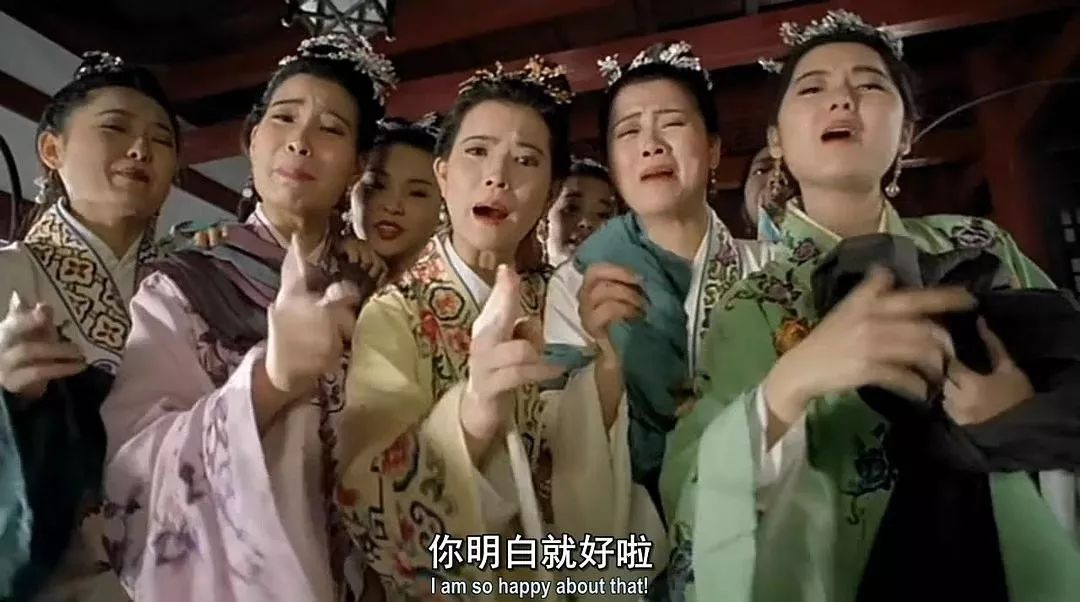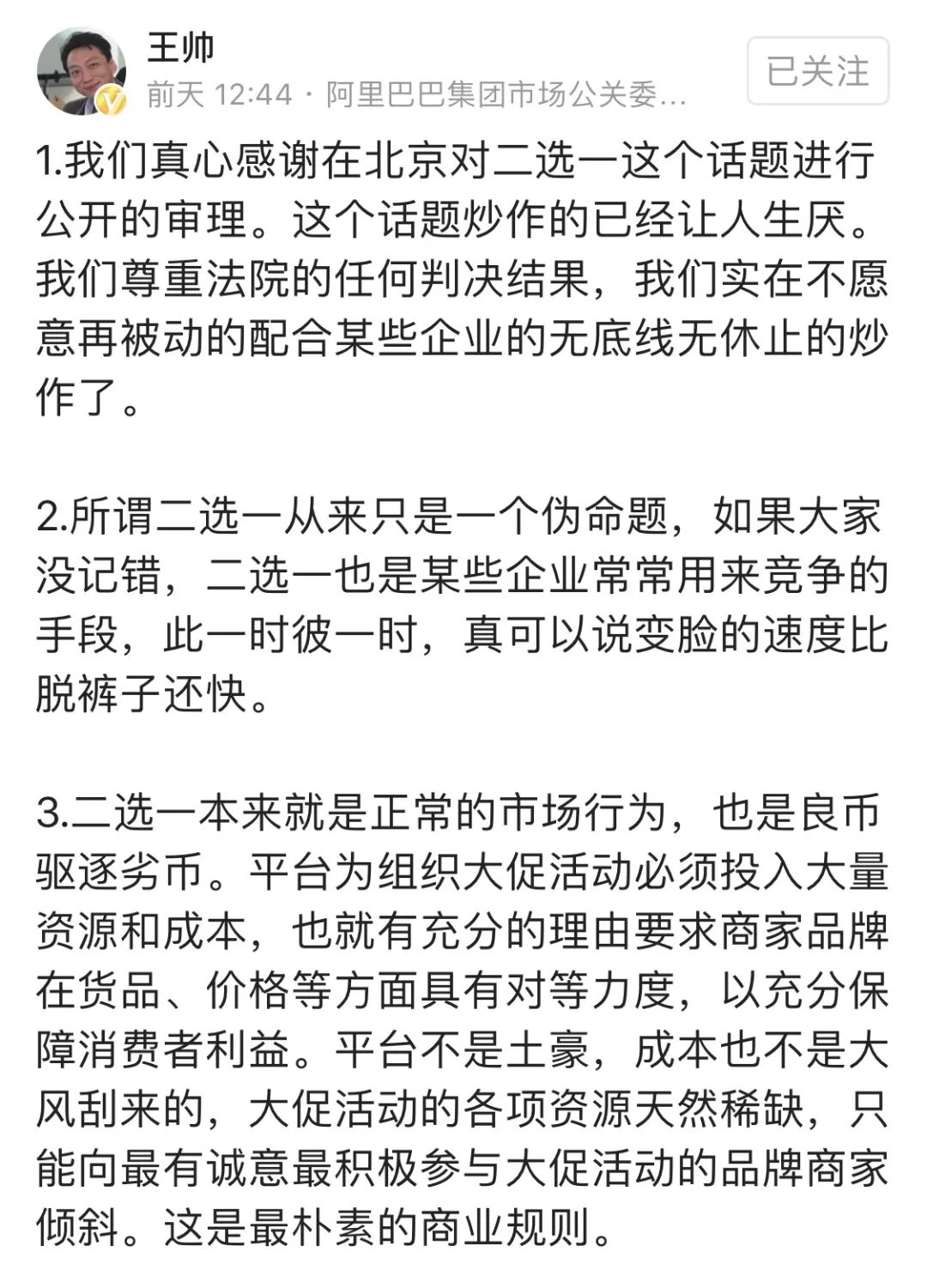When an e-commerce company says that he does not agree with “two choices one”, what is actually being said? When we are discussing “two choices”, do we really know what is being discussed?
Editor’s note: This article is from WeChat public account “Slightly Large Reference” (ID: hyzibenlun) , author Lin Yuxiang, editor of the wilderness. Authorized to publish.
In the past ten years, every time the key competitive time node of e-commerce promotion, “two choices one” has become the standard pre-heating method before the war, and it has been pulled by some platforms.
Since humans have entered modern civilization and strived for and strongly advocated “free choice”, perhaps there has not been a period in history, so that this concept has been abused so frequently in the commercial field, and it has become a brick in the moral field. Where to move – When a company is relatively weak in the industry, it is often picked up and thrown into competitors.
For example, in the name of maintaining the “free choice” of the business, blame and repeatedly speculate “two choices.”
The so-called “two choices one”, that is, the e-commerce platform requires the settled merchants to make choices between themselves and their competitors.
On October 14, Wang Shuai, chairman of the Alibaba Group’s market public relations committee, made a half-spoken statement on the second choice of business. The result was a public discussion on the “two choices one” issue in 2019.
Wang Shuai said that the so-called “two choices one” has always been false Propositions have become a means of public opinion attacks used by some companies for unfair competition. Alibaba is really reluctant to passively cooperate with some companies to endlessly hype,
The implication is that in the past ten years, every time the key competitive time node of e-commerce promotion, “two choices one” has become the standard pre-heating method before the war, and it has been pulled by some platforms.
At this time of the year, the public’s slanting of resources, the monopoly that may be involved, and the dissatisfaction with the information black market are most likely to be vented through onlookers and discussions. On the other hand, the platform side is the easiest to kidnap by ethical rivalry.
In this paradox fieldIt seems that because of the “two choices” involving the dispute caused by the monopoly, but scrutiny, this is just a commercial act of abducting with morality to obtain sympathy.
1
The 3Q battle that took place between Tencent and 360 in 2010 put “two choices” in front of Internet users, and was later quietly written into commercial art.
Tencent announced “a difficult decision” in the latter part of the war, that is, Tencent will be equipped with 360 because of the rumor that “360 has repeatedly created ‘QQ infringes on user privacy’ and maliciously smeared QQ’s security functions.” The software is stopped on the computer and the user must uninstall the 360 software to re-use QQ.
The result of this battle is that 60 million users have chosen QQ for this purpose, and uninstalled 360–In front of the selection, everyone will choose to vote with their feet after considering the gains and losses.
In the same year, Jingdong and Dangdang, which are in the stage of fierce competition, also staged a “two-choice one” drama.
At that time, Dangdang, which had just been listed, was in a strong momentum, and announced that it would fight the price war with excellence and Jingdong. Jingdong, which started from 3C, was not dominant in the book market. It was ranked after Dangdang, but was looking for opportunities to expand and seize. Share.
“Second one” became an important strategic choice for Jingdong at that time. According to the requirements of Jingdong, book merchants and publishing houses must choose one of the two platforms for sale. However, Liu Qiangdong later said in an interview with the media that Dangdang sent a letter to the publishing house asking him to “choose one.”
About who first shot, it’s hard to tell, but the result of this war is obvious. Jingdong’s short-term defeat, as a new player in the online book sales industry, Jingdong’s attraction to the publishing house is certainly not as good as the old-fashioned Dangdang, and more publishers chose the latter. However, in the long run, Jingdong is undoubtedly the one that benefited. Jingdong not only quickly cut a considerable portion of the book market share, but also laid the foundation for its status in the e-commerce industry.
More importantly, this allowed JD to explore a set of fine play styles that allowed the business team to control the opponent, and in the following years, it was repeatedly used as a yellow card for the opponent.
It also knows how to play a more favorable role in the war. Most of the time, this choice is a “victim.” Human natural sympathy for the weak is a plus item on the field of public opinion.
So, when Alibaba and the merchant signed an exclusive strategic cooperation, JD.com transformed into the role of the weak, using public opinion to continue to make serious condemnation and strong protest.
Changes occurred in August 2015, Tmall announced an exclusive cooperation agreement with more than 20 international brands such as Decathlon and Timberland, that is, the products of these brands can only be sold exclusively at Tmall. This is seen as “two choices” and no longer just in the promotion section.The point is used, but it becomes the normal state.
On the eve of the “Double 11” on the eve of the year, Jingdong reported to the State Administration for Industry and Commerce that Alibaba disturbed the e-commerce order and forced the merchants to “choose one or two” in the process of promotion. Ali then responded, “I can’t take porcelain and hype as a career. We respect the real name report, but today it’s the real name of the chicken, and the duck has monopolized the lake.”
About the accusation of “two choices one”, gradually became a group chat melee from the main dispute between the two.
On the eve of “Double 11” in 2017, when Jingdong accused Alibaba of “choose one of the two”, Suning angered Jingdong with the same charges. “Jingdong’s invention of the two-choice and hegemonic behavior and the systematic approach based on this. It has been unheard of in the past 30 years.”
Visible, criticizing the “two-choice one” behavior subject, the standing field is not static, it will choose the appropriate language according to their position in the industry. At this time, the motives of the protesters are debatable. In many cases, instead of saying that the protesters are applying for fairness and arousing justice for the business, it is better to say that it is because of the weak business, to compete for public opinion and to evoke the latter’s sympathy. And had to issue a battle essay.
In political language, this is called mobilizing the masses.
In the debate field, this is called the concept of stealing.
Public use is well-received, not only can get public emotional recognition with half the effort, but more importantly, it can be exchanged for commercial value. Creating a position defines morality, morality conforms to public opinion, and public opinion floods competitors. This has been tried and tested in the history of China’s Internet business in the past 10 years, and it is clearly not eliminated now.
2
“Two choices” fits into the Matthew effect, and the results of each war also reflect the natural choice of survival of the fittest and good money to expel bad money.
As early as 1950, the economist Alchin Allen in his paper “Uncertainty, Evolution, and Economic Theory” was the basic assumption of the “manufacturer’s pursuit of profit maximization” economics. A classic defense has been proposed.
He believes that the market economy itself provides the survival mechanism of the fittest, that is, it will eliminate the discomfort, choose the fittest, and only those enterprises that can maximize profits can survive. Competition between enterprises is everywhere, and it is not possible that the interests are both good and happy.
Today, this theory is still out of date. After all, the market provides a platform for fair competition. Merchants, brands and users will vote on their own feet and choose to stay. It is more reasonable to argue whether “two choices one” is reasonable, so as to carry out public opinion speculation and gain sympathy, it is better to study internal strengths and use strength to enhance attractiveness.
From the e-commerce platform itself, “two choices” is not difficult to understand.
The larger the platform, the higher the cost that is often required—whether it’s for day-to-day operating costs, operating costs

